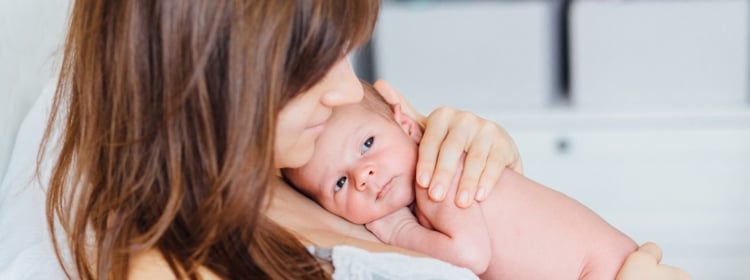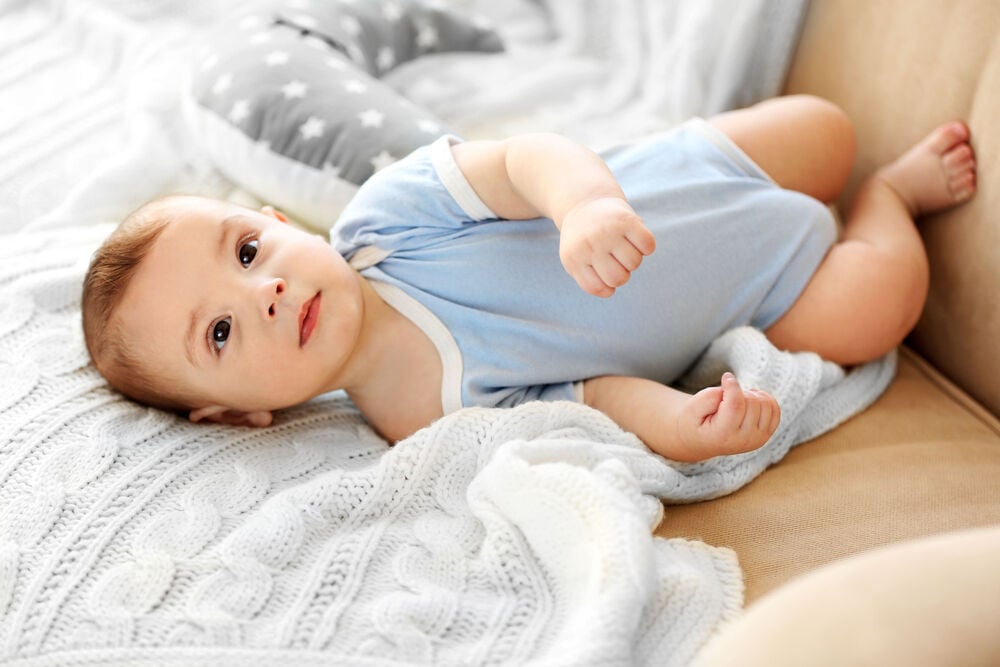As the mom of a newborn, you’re on high alert for potential health issues. You notice every movement and sound, and certain habits – such as chin twitching – seem a bit stranger than others. Why do chin muscle spasms occur? Should you be worried?
-
Tracking cycle
-
Getting pregnant
-
Pregnancy
-
Help Center
-
Flo for Partners
-
Anonymous Mode
-
Flo app reviews
-
Flo Premium New
-
Secret Chats New
-
Symptom Checker New
-
Your cycle
-
Health 360°
-
Getting pregnant
-
Pregnancy
-
Being a mom
-
LGBTQ+
-
Quizzes
-
Ovulation calculator
-
hCG calculator
-
Pregnancy test calculator
-
Menstrual cycle calculator
-
Period calculator
-
Implantation calculator
-
Pregnancy weeks to months calculator
-
Pregnancy due date calculator
-
IVF and FET due date calculator
-
Due date calculator by ultrasound
-
Medical Affairs
-
Science & Research
-
Pass It On Project New
-
Privacy Portal
-
Press Center
-
Flo Accuracy
-
Careers
-
Contact Us
Baby’s Chin Twitching: Is It Perfectly Normal or a Reason for Concern?


Every piece of content at Flo Health adheres to the highest editorial standards for language, style, and medical accuracy. To learn what we do to deliver the best health and lifestyle insights to you, check out our content review principles.
Possible reasons behind chin twitching
In the first few months of parenthood, you’re probably filled with questions about your child’s development. Naturally, you want to ensure they’re healthy and growing, so you’re bound to be on the lookout for any unusual symptoms or behaviors.
At this stage, their neurological system is undergoing some major changes. They’re learning how to move their bodies (after spending several months curled up inside a cramped uterus). Slowly but surely, they’re sharpening skills like muscle control and coordination.
This is why your infant’s brain might be firing off more electrical impulses than necessary. Occasional muscle twitching or small, involuntary spasms are common right now. So you really shouldn’t be surprised to see your little one’s chin quivering, even when they’re not crying.
Often times, these jittery impulses are caused by a hormone called norepinephrine, which their body releases in response to stress. As norepinephrine levels decrease, so will the frequency of your baby’s chin tremors.
Have you also witnessed a chin muscle spasm or two while your newborn’s asleep? During the rapid eye movement (REM) sleep cycle, muscle twitching is to be expected. This is the phase in which their sensorimotor development occurs. Their brain and body are busy integrating what they’ve learned so far, while simultaneously strengthening neural pathways.
Breastfeeding is another possible explanation for chin twitching or jaw quivering. Although it sounds like a straightforward process, breastfeeding actually requires a complex series of muscle movements in the tongue, jaw, throat, lips, and face. It’s especially likely in the first few weeks for your baby’s jaw to quiver or tremble due to muscle fatigue.
Other plausible explanations for chin muscle spasms include:
- A vitamin D deficiency
- Hypoglycemia (low blood sugar levels)
- Hypothermia (due to a sudden drop in body temperature)
If you suspect it could be one of these three things, be sure to consult your pediatrician.
Chin quivering: should you be on the lookout?

Take a quiz
Find out what you can do with our Health Assistant
So how can you be certain that your baby’s chin spasm is a completely normal part of their development? Chin twitching on its own is usually nothing to worry about. And in most cases, a chin tremor is simply a signal that your little one is close to tears.
Chin quivering should be considered commonplace as long as the following things appear to be functioning properly:
- Muscle reflexes during formula or breastfeeding
- Protective muscle reflexes when they’re startled or surprised
- Breathing and sleep patterns
However, more pronounced infant tremors – in which larger muscle groups or body parts spasm continuously for several seconds – should not be ignored. It could be an indication of a serious neurological condition. Be on the lookout for occasional jaw trembling that is accompanied by:
- Difficulty sleeping or breathing
- Increased fussiness or silence
- Loss of social interaction cues, such as smiling
- Lack of learning or developmental growth
If your baby is not in immediate danger, try to record the infant tremors while they’re happening. In certain cases, the spasms could be a sign of epilepsy, Down syndrome, or physical trauma.
These general guidelines regarding chin twitching are intended to be helpful, not to produce unnecessary stress or anxiety. As always, it’s best to make an appointment with your baby’s doctor for further advice and evaluation.
What if chin quivering doesn’t go away?
As mentioned above, chin muscle spasms are a typical part of your newborn’s motor development and should only last for a few months. In rare instances, infant tremors or muscle spasms may continue until the age of 4. A chin spasm resulting from a hereditary or neurological condition could potentially impact their speech, motor skills, and even behavior.
Consider discussing symptoms with a professional when tremors are first observed. If necessary, blood tests or brain scans might be used to determine the underlying cause. In the event of a movement disorder (such as myoclonic jerks), the sooner treatment begins, the better the outcome.
For most babies, chin twitching is an ordinary reflex which doesn’t lead to any pain or discomfort. It’s merely a sign that their nervous system is progressing exactly as it should.


Hey, I'm Anique
I started using Flo app to track my period and ovulation because we wanted to have a baby.


The Flo app helped me learn about my body and spot ovulation signs during our conception journey.


I vividly
remember the day
that we switched
Flo into
Pregnancy Mode — it was
such a special
moment.
Real stories, real results
Learn how the Flo app became an amazing cheerleader for us on our conception journey.




